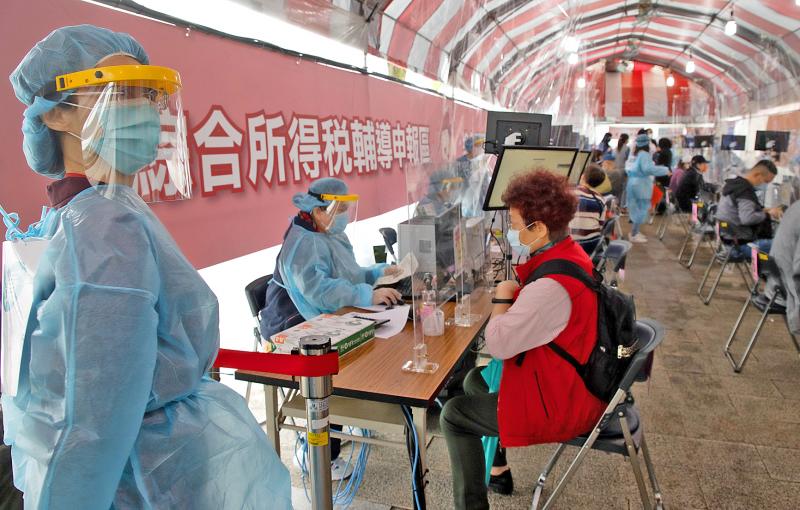The government last month collected NT$135.2 billion (US$4.55 billion) in tax revenue, up NT$2.5 billion, or 1.9 percent, from a year earlier, Ministry of Finance data showed yesterday.
The biggest increase came from corporate income tax, which rose by NT$10.5 billion from a year earlier, as there were large tax refunds last year, the ministry said in a statement.
Other major revenue increases last month came from personal income tax, which grew by NT$4.4 billion, license plate tax, which climbed by NT$1.1 billion, and business tax, which increased by NT$4.5 billion, the ministry said.

Photo: CNA
However, securities transaction tax revenue decreased by NT$9.2 billion, or 37.5 percent, year-on-year — the largest annual decrease in three years — as the daily trading turnover on the local bourse averaged NT$320 billion, compared with NT$526.9 billion a year earlier, it said.
Commodity tax revenue declined by NT$3.1 billion, as the government lowered import duties on fuel products to curb inflation, the ministry said.
In the first four months of the year, cumulative tax revenue rose by NT$18 billion, or 3 percent, year-on-year to a record NT$617.9 billion, ministry data showed.
The January-to-April total accounted for only 22.7 percent of the government’s target for the full year, as increases in revenues from corporate income, individual income and business taxes were offset by decreases in revenues from commodity and securities transaction taxes, the ministry said.
Ministry data showed that corporate income tax revenue increased by NT$18.4 billion, individual income tax revenue grew by NT$18 billion and business tax revenue rose by NT$4.5 billion in the four-month period, while commodity tax revenue declined by NT$10.8 billion.
Tax revenue from securities transactions in the first four months fell by NT$14.9 billion, or 18.5 percent, as the average daily trading turnover dropped to NT$352.1 billion, from NT$433.1 billion a year earlier, data showed.

French President Emmanuel Macron told a global artificial intelligence (AI) summit in India yesterday he was determined to ensure safe oversight of the fast-evolving technology. The EU has led the way for global regulation with its Artificial Intelligence Act, which was adopted in 2024 and is coming into force in phases. “We are determined to continue to shape the rules of the game... with our allies such as India,” Macron said in New Delhi. “Europe is not blindly focused on regulation — Europe is a space for innovation and investment, but it is a safe space.” The AI Impact Summit is the fourth

CONFUSION: Taiwan, Japan and other big exporters are cautiously monitoring the situation, while analysts said more Trump responses ate likely after his loss in court US trading partners in Asia started weighing fresh uncertainties yesterday after President Donald Trump vowed to impose a new tariff on imports, hours after the Supreme Court struck down many of the sweeping levies he used to launch a global trade war. The court’s ruling invalidated a number of tariffs that the Trump administration had imposed on Asian export powerhouses from China and South Korea to Japan and Taiwan, the world’s largest chip maker and a key player in tech supply chains. Within hours, Trump said he would impose a new 10 percent duty on US imports from all countries starting on

STRATEGIC ALLIANCE: The initiative is aimed at protecting semiconductor supply chain resilience to reduce dependence on China-dominated manufacturing hubs India yesterday joined a US-led initiative to strengthen technology cooperation among strategic allies in a move that underscores the nations’ warming ties after a brief strain over New Delhi’s unabated purchase of discounted Russian oil. The decision aligns India closely with Washington’s efforts to build secure supply chains for semiconductors, advanced manufacturing and critical technologies at a time when geopolitical competition with China is intensifying. It also signals a reset in relations following friction over energy trade and tariffs. Nations that have joined the Pax Silica framework include Japan, South Korea, the UK and Israel. “Pax Silica will be a group of nations

Like many of us who are mindful of our plastic consumption, Beth Gardiner would take her own bags to the supermarket and be annoyed whenever she forgot to do so. Out without her refillable bottle, she would avoid buying bottled water. “Here I am, in my own little life, worrying about that and trying to use less plastic,” she says. Then she read an article in this newspaper, just over eight years ago, and discovered that fossil fuel companies had plowed more than US$180 billion into plastic plants in the US since 2010. “It was a kick in the teeth,” Gardiner